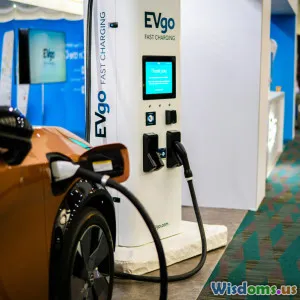
The Importance of Clean Energy Solutions
6 min read Explore the significance of clean energy solutions for a sustainable future. (0 Reviews)
The Importance of Clean Energy Solutions
In a world increasingly aware of the pressing challenges posed by climate change, the call for clean energy solutions has become louder and more urgent. Clean energy refers to the production and consumption of energy in ways that have minimal impact on the environment, particularly in terms of greenhouse gas emissions. As we look towards a sustainable future, understanding the importance of clean energy solutions is vital for individuals, businesses, and governments alike.
The Environmental Impact of Traditional Energy Sources
Traditional energy sources, primarily fossil fuels such as coal, oil, and natural gas, have long been the backbone of global energy production. However, their extraction and use come with severe environmental costs:
- Greenhouse Gas Emissions: Burning fossil fuels releases significant amounts of carbon dioxide (CO2) and other greenhouse gases into the atmosphere, contributing to global warming and climate change.
- Air Pollution: The combustion of fossil fuels releases pollutants that can harm human health, leading to respiratory diseases and other serious health conditions.
- Ecosystem Damage: Oil spills, coal mining, and gas drilling can devastate local ecosystems, leading to loss of biodiversity and habitat destruction.
Clean Energy Solutions Explained
Clean energy encompasses various technologies and practices designed to generate energy without the harmful byproducts associated with fossil fuels. Some of the key clean energy solutions include:
- Solar Energy: Harnessing sunlight through solar panels for electricity or heating.
- Wind Energy: Utilizing wind turbines to convert wind into electricity.
- Hydropower: Generating energy from flowing water, typically through dams.
- Geothermal Energy: Using the earth's internal heat for energy production and heating.
- Biomass Energy: Converting organic materials into energy, which can reduce waste and reliance on fossil fuels.
Benefits of Clean Energy Solutions
Transitioning to clean energy solutions offers a multitude of benefits:
- Reduction in Carbon Footprint: Clean energy significantly lowers greenhouse gas emissions, making it an essential component of global efforts to combat climate change.
- Energy Independence: By investing in local clean energy sources, countries can reduce their dependence on imported fossil fuels, enhancing their energy security.
- Job Creation: The clean energy sector is rapidly growing and creates a wide variety of jobs, from manufacturing to installation and maintenance.
- Economic Growth: Investing in clean energy can stimulate economic development by fostering innovation and attracting investments.
- Health Benefits: Reducing air pollution leads to improved public health outcomes, resulting in lower healthcare costs and a better quality of life for communities.
Challenges in Transitioning to Clean Energy
Despite the clear advantages, the transition to clean energy solutions is not without challenges:
- Initial Costs: The upfront investment for clean energy technologies can be high, although prices are steadily decreasing.
- Infrastructure Needs: Transitioning requires significant changes to existing energy infrastructures, such as upgrading power grids.
- Policy and Regulation: Governments must implement supportive policies and regulations to encourage clean energy adoption and investment.
The Future of Clean Energy Solutions
Looking ahead, the future of clean energy appears promising. Advances in technology, such as improved battery storage and smart grid systems, will enhance the efficiency and reliability of clean energy sources. Furthermore, growing public awareness and demand for sustainable practices will pressure governments and corporations to prioritize clean energy initiatives.
As we navigate the complexities of climate change and environmental degradation, embracing clean energy solutions is not just an option; it is a necessity. By investing in these solutions, we can create a sustainable future that benefits both the planet and its inhabitants.
Conclusion
In conclusion, clean energy solutions play a crucial role in promoting sustainability and protecting our environment. They provide a pathway to reduce greenhouse gas emissions, create economic opportunities, and improve public health. As we face the challenges of climate change, the transition to clean energy is imperative for ensuring a healthier, more sustainable world for future generations. By prioritizing these initiatives, we can not only preserve our planet but also unlock a new era of innovation and prosperity.
Rate the Post
User Reviews
Popular Posts





















